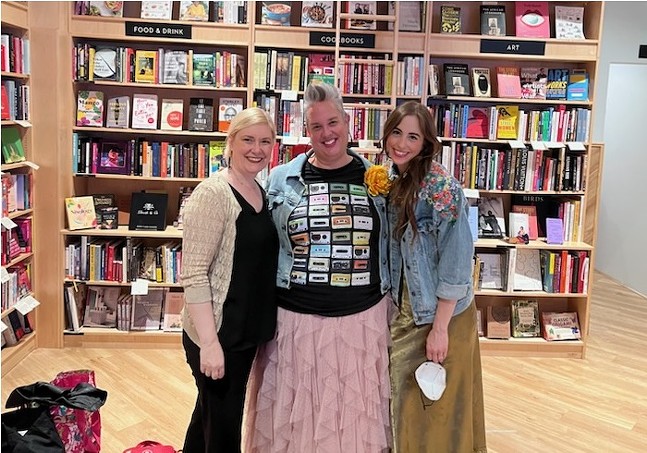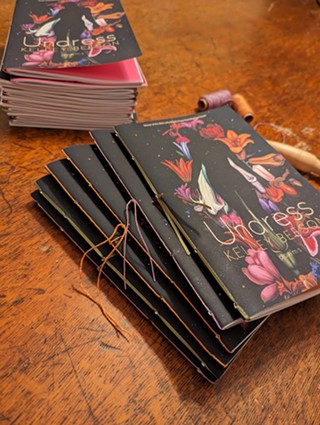
The debut chapbook — a typically thin, 'zine-style paperback — recently won the inaugural Lefty Blondie Press Chapbook Award. Creating space for messy realities is an operating model for Lefty Blondie Press, a Pittsburgh-based publisher of women-identifying and non-binary poets.
“Empathy is the way we do things,” co-founder and co-editor Amy Lee Heinlen says. “We’re building a community of writers that invites the whole person. We want poets to believe in their art and to take risks without apologizing. Wear the prom dress with the leather jacket and biker boots — we can be it all.”
Beeson wrote the poems in Undress when her marriage dissolved.
“I had just gone through a divorce, and I was entering a grieving process,” she says. “It was scary to stand in that anger, to own it.”
Sometimes, her poetry delights in her rage. The chapbook’s opening poem fantasizes, When he comes for his things, I will ask the house to burn him down/I picture her gathering her brawn/I hear his crackling skin, his bilious body set aflame. Another poem reads, I wish for everything/wrenched from everyone.
“The book is cyclical,” says Marguerite Miller, co-founder and co-editor of Lefty Blondie Press. “It moves from grief, loss, and pain to joy, and back again."
But Beeson’s poems also celebrate what grief leaves behind. “When the divorce happened, I missed my mother, who died 15 years ago,” she says. “I found myself in my car listening to her music, crying, and dancing. And I discovered that each loss is connected to every other loss.”
In a love letter to the staying power of her mother’s life, Beeson writes, But the funny thing around grief is the electricity it creates: currents and cracks lighting the way around the new long-limbed world/Joy and grief mingle/They circle and move like a mobile near the ceiling.
Submitting her poems to a publishing contest felt like a risk to Beeson.
“Poetry is tricky,” she says. “When I wrote these poems, I wasn’t sure if they were just for me or for other people. But I felt a need to share them so others could see themselves in these physical sensations of grief.”
If each grief is its own planet, Undress is strictly Beeson’s, but she invites others to sit with her. “I’m talking about loneliness,” she writes. “I’m talking to you now.” The brilliant insight and crackling imagery of her work allow readers to warm themselves by the light of her mourning.
In the chapbook’s acknowledgments, Beeson recognizes Anne Sexton as an important literary influence. Sexton’s fingerprints are visible in the poem “Tender Heart Club,” the title of which comes from a letter that Sexton wrote to W.D. Snodgrass in 1968. Like Sexton, Beeson spares nothing: I can tell you 2 things: it won’t be a joyride/and I’m going to write everything down, even the confusing sparks/of electricity and chaos.
The result is uncomfortable but revelatory reading. For those who have seen their own lives remade by grief, the poems come in the voice of a friend.
Miller and Heinlen have big plans for the future of Lefty Blondie. They will continue to work with poets from communities underrepresented in publishing — the Lefty Blondie Press Editor’s Choice BROADSIDE Series Contest is currently open until Dec. 15, and submissions for Lefty Blondie’s 2024 Chapbook Award begin on Jan. 1, 2024.
Reflecting on the months they spent working closely with Beeson to create each hand-cut, hand-bound, and hand-numbered copy of Undress, Heinlen says, “This is life-changing for us as well. To build a literary community based on trust is exactly what we are trying to do.”














